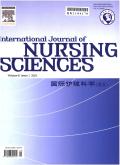Unveiling the hidden connection: Investigating the relationship between shared leadership and missed nursing care
IF 3.1
3区 医学
Q1 NURSING
引用次数: 0
Abstract
Objectives
This study examined the levels of shared leadership and missed nursing care and their relationship among nurses in Egypt.
Methods
A cross-sectional survey was conducted. From February to April 2024, 340 nurses worked in all inpatient care units at Alexandria Main University Hospital. The Shared Leadership and Missed Nursing Care Survey was used for evaluation.
Results
The overall score of shared leadership was (72.62 ± 4.30), which imitates a high perception of shared leadership among nurses; the dimension of delegation achieved the highest average mean score (3.66 ± 0.26), followed by collaboration (3.64 ± 0.31), the vision dimension scored the lowest mean score (3.59 ± 0.33). The elements of missed nursing care had a total score of (46.72 ± 5.69), and the dimension of secondary care achieved the highest average mean score (3.74 ± 0.31). The reasons for missed nursing care had a total mean score of (22.40 ± 1.59), and the dimension of labor resources achieved the highest average mean score (3.20 ± 0.22). Male nurses, less than 30 years old, married, held a bachelor’s degree in nursing sciences, less than five years of experience in the nursing profession, and less than five years of experience in the current working unit had higher total scores of the shared leadership and lower total scores of missed nursing care (P < 0.001). A negative correlation existed between shared leadership and two dimentisons (the elements of nursing care [r = −0.383], the reasons for missing nursing care [r = −0.047]) (P < 0.001).
Conclusions
The study’s findings can help as a theoretical underpinning for nursing leaders to stand in an environment that reduces the incidence of missed nursing care by encouraging teamwork, responsibility, workload management, and empowerment among nurses.
揭示隐藏的联系:调查共享领导和错过护理之间的关系
目的本研究调查了埃及护士的共同领导和错过护理的水平及其关系。方法采用横断面调查方法。从2024年2月到4月,340名护士在亚历山大美因大学医院的所有住院护理部门工作。采用“共同领导与缺失护理调查”进行评价。结果护士共享领导总分为(72.62±4.30)分,对共享领导有较高的认知;授权维度平均得分最高(3.66±0.26),协作维度平均得分次之(3.64±0.31),视觉维度平均得分最低(3.59±0.33)。护理缺失各维度总分为(46.72±5.69)分,其中二级护理缺失各维度平均得分最高(3.74±0.31)分。护理缺失原因的平均得分为(22.40±1.59)分,其中劳动力资源维度的平均得分最高,为(3.20±0.22)分。年龄在30岁以下、已婚、护理专业本科学历、从事护理专业工作年限在5年以下、在本工作单位工作年限在5年以下的男护士,共同领导总分较高,错过护理总分较低(P <;0.001)。共享领导与护理要素[r =−0.383]、缺失护理原因[r =−0.047]两个维度呈负相关(P <;0.001)。结论:本研究的结果可以作为理论基础,帮助护理领导者站在一个通过鼓励护士团队合作、责任、工作量管理和授权来减少护理遗漏发生率的环境中。
本文章由计算机程序翻译,如有差异,请以英文原文为准。
求助全文
约1分钟内获得全文
求助全文
来源期刊

International Journal of Nursing Sciences
Nursing-Nursing (all)
CiteScore
6.10
自引率
2.60%
发文量
408
审稿时长
25 days
期刊介绍:
This journal aims to promote excellence in nursing and health care through the dissemination of the latest, evidence-based, peer-reviewed clinical information and original research, providing an international platform for exchanging knowledge, research findings and nursing practice experience. This journal covers a wide range of nursing topics such as advanced nursing practice, bio-psychosocial issues related to health, cultural perspectives, lifestyle change as a component of health promotion, chronic disease, including end-of-life care, family care giving. IJNSS publishes four issues per year in Jan/Apr/Jul/Oct. IJNSS intended readership includes practicing nurses in all spheres and at all levels who are committed to advancing practice and professional development on the basis of new knowledge and evidence; managers and senior members of the nursing; nurse educators and nursing students etc. IJNSS seeks to enrich insight into clinical need and the implications for nursing intervention and models of service delivery. Contributions are welcomed from other health professions on issues that have a direct impact on nursing practice.
 求助内容:
求助内容: 应助结果提醒方式:
应助结果提醒方式:


